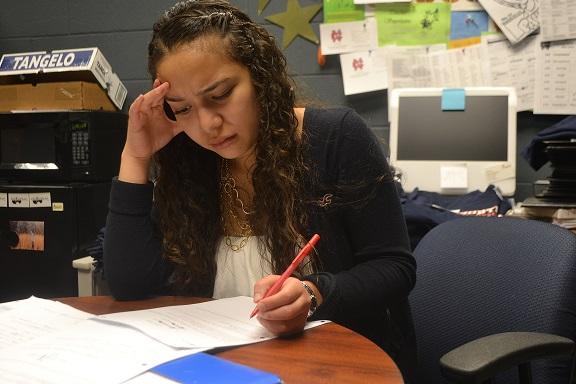College myths busted: What seniors need to know about decisions

Students, seniors specifically, stress over the weight of filling out college applications. Senior Jackie Banos gives us a little insight on how stressful it can be. “Dealing with college stuff is one of the more stressful things I’ve done because it basically starts the rest of my life,” Banos said.
October 28, 2014
As college deadlines approach, seniors scramble to fill out applications and apply for various scholarships. The process proves tiresome; seniors face obstacles such as the “do’s and don’ts” of a college application. However, are the myths surrounding college true?
“I heard that it’s easier to get into college if you do early action rather than regular decision,” senior Jacky Baños claimed.
Applying for early action indeed increases one’s chance of getting in only because less students apply for early action; however, early action usually comes with harsher requirements surrounding GPA and SAT/ACT scores. Similarly, students believe that applying early action shows they are eager for college.
The UGA board of admissions denies this myth and declares that “applicants deferred from early action to regular decision do not have any advantages/disadvantages over those who apply regular decision. All applicants seeking admission to UGA are offered an equal opportunity for admission regardless of the decision plan.”
Most colleges look for students that display rigor. While a 4.0 does not hurt, AP classes never cease to impress.
“I heard that a student with a lower GPA and all AP classes will be chosen over a student who has a higher GPA and little to no AP classes,” senior Travis Onyima said.
Some students believe that the emails they receive from colleges are indicative of possible acceptance.
“Someone told me that if colleges are sending you information, they’ll probably accept you,” senior Makayla Brimmage said.
Actually, just because a college sends out emails to certain students, does not ensure their acceptance. Their decision lies solely on the application; emails and letters are just marketing strategies used to persuade students to apply for their college.
“I’ve heard stories of students not getting accepted into college because of stuff they post on their social media,” senior Amelia Seay claimed.
These stories, or at least some of them, stand true. Colleges often research their applicants, especially the ones that apply for prestigious scholarships. Rumor has it, colleges now look into how many “selfies” students post in a day. Maybe Warriors should spend a little less time tweeting and a little more time studying.





